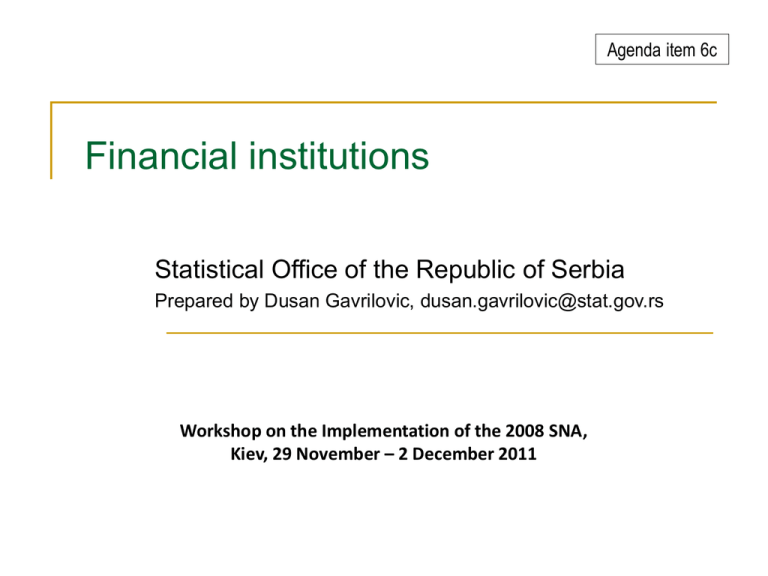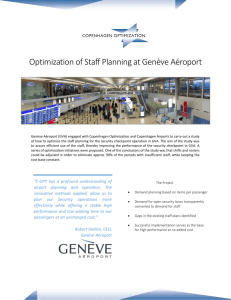Financial institutions Statistical Office of the Republic of Serbia Agenda item 6c
advertisement

Agenda item 6c Financial institutions Statistical Office of the Republic of Serbia Prepared by Dusan Gavrilovic, dusan.gavrilovic@stat.gov.rs Workshop on the Implementation of the 2008 SNA, Kiev, 29 November – 2 December 2011 Organizational structure The financial corporations sector can be divided into five following subsectors: S.121 Central Bank This includes National Bank of Serbia (NBS) as central and governing monetary and credit institution in the financial system of Republic of Serbia. S.122 Other monetary financial institutions (NACE 64.19) This is the most important subsection among the financial institutions with respect to the creation of GVA, and contains banks, i.e. depository financial intermediaries, as the major FISIM producers. S.123 Other financial intermediaries (NACE 64.9) This subsection comprises financial leasing companies, investment funds (excluding fund managing companies) and other credit granting (non-depository) companies. Organizational structure, continued S.124 Auxiliary financial services (NACE 66) This includes the following enterprises: • Agency for deposit insurance • Central Securities Depository and Clearing House • Securities Commission • Belgrade Stock Exchange • Companies engaged in securities brokerage and dealing • Pension and Investment Fund managing companies, • Diners club and North American Sureties (NAS) • Other incorporated enterprises engaged in auxiliary financial services (bureaux de change, investment advisory services, activities of insurance agents and brokers etc.) S.125 Insurance and pension funds (NACE 65) Data sources The major data source for all the calculations and derivation of macroeconomic aggregates is the database of the Serbian Business Registry Agency which comprises the register of all institutional units engaged in financial intermediation together with the full set of the annual financial statements of each enterprise. Apart from annual financial statements, for the calculations related to the banks and the NBS, the detailed NBS report on all the bookkeeping accounts is available together with a special audit report on operations of the NBS. Almost all the variables needed for the calculation of NA aggregates are derived directly from the financial statements Data sources, continued In the 2007 a survey on banks and insurance companies was launched in order to collect regionalized data on employment, local units and wages and salaries. This survey contains also the questions about trade margins on foreign exchange, current and capital transfers It also covers regionalized data on deposits and loans, fees and commissions (for banking industry) and gross premiums written (for insurance business). Data are collected on municipal level and are used for the compilation of regional accounts. Output, intermediate consumption, GVA National Bank of Serbia (NACE 64.11) The output, IC and GVA of the NBS as the only unit of the subsector S.124 is calculated using the cost method according to the paragraph 3.63 of ESA95 and the 448/98 Council Regulation. Output comprises all the operating expenditures and costs of the NBS including fees and commissions payable, compensation of employees and consumption of fixed capital. Output and IC do not include any kind of income or costs from financial operations, non-operating and extraordinary incomes or expenditures. All the output of the NBS is consumed and added to intermediate consumption of the subsector S.122 - Other monetary financial institutions. Output, intermediate consumption, GVA Other monetary financial institutions (NACE 64.19) This subsector represents the major GVA generator among the financial institutions (about 67% of the total of GVA). The biggest part of the output of these units comes from the income from net interest margin or in the terminology of the NA - Financial Intermediation Services Indirectly Measured (FISIM). In Serbian National Account the FISIM is calculated using the formula given in Council Regulation 295/2008 concerning structural business statistics (Annex 6 on Credit Institutions). The production value is calculated as the sum of FISIM, income from fees and commissions receivable, trade margins on foreign exchange and securities and other operating income (mainly rentals and sales of goods and services). Unfortunately, due to the lack of data the FISIM is still not allocated to the user sectors and is included into the system via notional sector and subtracted from the GDP of the whole economy. Output, intermediate consumption, GVA Other financial financial services except insurance and pension funding (NACE 64.2, 64.3 and 64.9) Apart from financial leasing this group covers all other money lending activities outside the banking system including factoring services and pawn brokers. Except for the investment funds and financial leasing companies the financial reporting format is exactly the same as for the non-financial corporations. The value of the output and IC is measured using the same items and formula for the nonfinancial corporations. Thus, the output is measured as net income from sales of goods and services with cost of goods for resale subtracted. Output includes also other operating income such as rentals but excludes any kind of non-operating or extraordinary income. For financial leasing companies and other credit granting institutions the main source of the output is the FISIM which is added to the above mentioned elements of output. The FISIM is calculated as difference between interest payable and interest receivable. Output, intermediate consumption, GVA 64.30 Trusts, funds and similar financial entities and 64.20 Holding companies The output of the investment funds is calculated in a specific way due to the specific nature of these institutions which are in fact notional institutional units. investment funds in Serbia are open-ended non-incorporated (common) funds constituted under the law of contract and managed by management companies and with no paid employees. They are not recognized as legal persons and are treated as pools of assets with no legal capacity but they are legally separated from the shareholders and companies that manage them. However, according to the Law on investment funds and bookkeeping regulation, the fund can incur costs (which diminish net worth of the fund) and operating income such as rentals and this requires treatment in line with NA principles of recording of the financial transactions. So, the value of operating costs (cost of services of the managing company, costs related to the purchases and sales of securities, costs of custodial services and other operating costs) are imputed to the funds as the output and the same figure is treated as the IC so the GVA (and operating surplus as well) equals zero. At this moment no trusts, estates or agency accounts are operating. Only mutual and closed-end investment funds. Only few “pure” holding companies are operating in Serbia and this group of financial institutions are under closer examination for proper sectorization. Output, intermediate consumption, GVA Insurance and pension funding (NACE 65) The output of insurers is calculated using formula defined in the ESA95 Annex on Insurance and Commission Regulation 295/2008 (Annex 5) as the sum of earned premiums plus premium supplements (portfolio investment income) plus other operating income minus gross claims payments minus gross change in the provision for outstanding claims and minus changes in other insurance provisions. Claims management expenses are not included in claims incurred and represent the part of IC together with the acquisition, management costs, costs related to the investments of the technical reserves and other operating costs excluding consumption of fixed capital (CFC), personnel costs and taxes on production. The intermediate consumption apart from other regular, operating expenditure (excluding personnel costs) also includes a reinsurance balance. Reinsurers are treated the same way as direct insurers regarding calculation of the output and IC. Output, intermediate consumption, GVA The output of the pension funds is calculated on the basis of the Annex 7 of the Council Regulation 295/2008. Pension funds in Serbia are organized as open-ended non-incorporated (common) funds constituted under the law of contract and managed by management companies and with no paid employees. In the production account the production value is defined as follows: pension contributions less insurance premiums payable plus investment income plus other income plus insurance claims receivable less total expenditure on pensions less net change in technical provisions. Intermediate consumption of the pension funds comprises payments for managing services of the fund managing companies, costs of services provided to the members of the fund, other operating costs and fees charged with pension contributions. Gross technical provisions represent the balancing item with no income appropriated to general reserve and zero value of GVA. Output, intermediate consumption, GVA Auxilliary financial service providers are also covered with the whole set of financial statements (including small businesses) which are the main data source for derivation of NA aggregates. In the case of security brokerage and dealing the output of companies engaged in these activities includes next to commissions and fees also the net margin on sales of securities. Output of the pension fund managing companies comprises commissions for management of funds and fees charged on pension contributions and services provided to the members of the fund. Output of investment fund managing companies comprises commissions and fees for management of the funds, for transactions with securities and other operating income.
